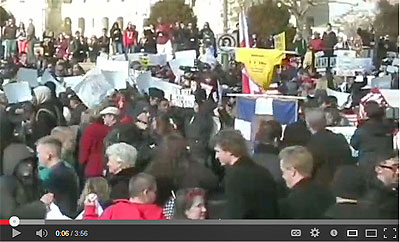Analysis of the Prop 8 and DOMA “gay marriages” cases before US Supreme Court — what’s going on and what could happen.
The following comprehensive analysis is provided by MassResistance.org:
As most people know, this is a terribly critical time regarding the imposition of “gay marriage” on America.
On Tuesday, March 26, the United States Supreme Court in Washington heard arguments on the lawsuit to overturn the Proposition 8 Constitutional Amendment vote in California. The following day, the Court heard arguments on the lawsuit to overturn the Defense of Marriage Act (DOMA).
Either of these would be huge wins for the homosexual movement and could change the country similar to the way that the repeal of “Don’t Ask Don’t Tell” changed the military.
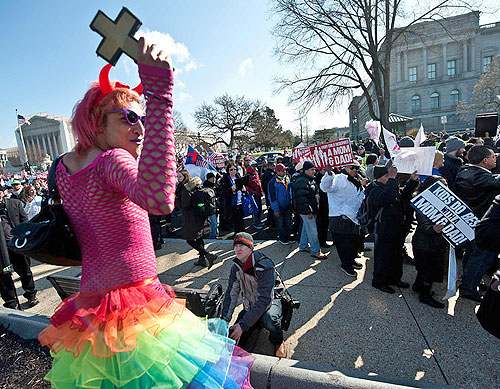
Christian-bashing. Homosexual activist taunts Christians gathered near US
Supreme Court building during “gay marriage” arguments. Expect to see
more of this if any of these cases wins.
Both of these cases were strategically targeted and crafted for maximum success. And they were filed in carefully chosen venues to get the most gay-friendly federal judges. All of that worked out stunningly for the homosexual legal teams. Both cases sailed through the federal courts with barely a hitch. And both, as we shall see, were further aided by less than stellar representation by their opposition.
Both cases have generated mountains of paperwork in their filings, amicus briefs, and rulings, along with the myriad of groups and individuals that have been involved on each side,. It can be quite overwhelming. Our aim here is to explain all this in reasonably simple terms.
Most important to understand is that both of these cases have used the “equal protection under the law” clause of the US Constitution’s 14th Amendment as their primary argument. And in our opinion, this what the pro-family side has largely failed to effectively defend.
The Proposition 8 Case
Since 1998, 30 states have passed constitutional amendments to ban same-sex “marriage.” An additional state, Hawaii, passed an amendment to allow the legislature to decide. Nine states currently allow same-sex “marriage.”
The homosexual movement calculated that it could undo all of this by getting a federal court to declare such an amendment unconstitutional. They decided to target the California amendment, known as “Proposition 8”, which was passed in 2008.

Tolerance? During Proposition 8 campaign in California, two lesbians parked this car in front of home of parents and 5 children who supported Proposition 8.
There were good reasons for this choice. California is in the very liberal 9th Circuit federal court district. But in addition, they were able to arrange for Judge Vaughn Walker to preside over the case. Walker, who later publicly acknowledged he was homosexual, struck down the amendment. (However, he did order a stay of enforcement until it worked its way through the legal system. This stay was challenged in court by the homosexual legal team but in this they were not successful.)
The gist of the case, as mentioned above, is that under the “equal protection under the law” clause of the US Constitution, homosexuals who want to marry were being treated differently from heterosexuals who want to marry. Instead, California allows them to enter into civil unions. Such discrimination is unconstitutional, they argue. Homosexual couples should have the same rights to marry as heterosexuals, because they as citizens have the same basic civil rights. The federal judge and the appeals judges all agreed with that reasoning.
The counter-argument was that the same laws on marriage apply to everybody — i.e., everyone can marry someone of the opposite sex — therefore, there’s no “equal protection” problem. But that was rejected by the judges. The fact that the lawyers on our side accepted California’s civil union law as a legitimate compromise made that argument difficult to defend. (That was another strategic reason for choosing California as the target.)
But beyond that, the pro-family handling of that case was widely criticized as a “perfect storm” of incompetence and non-aggression. See the MassResistance report from 2010 on this.
It’s always appeared to us that the only effective way to discredit the “equal protection” argument would be to discredit homosexual behavior itself. It should be easy. There’s certainly an enormous amount of material to do that. But the pro-family lawyers have almost completely avoided that approach.
Thus, during the US Supreme Court arguments, when the right made a brief foray into some stronger points, it didn’t go well. Here’s how (the far-left pro-gay) Mother Jones magazine reported on pro-family lawyer Charles J. Cooper’s interchange with the justices:
When Cooper argued that California was justified in enacting the ban because of “society’s interest in responsible procreation,” Justice Elena Kagan asked if it would be constitutional to ban marriages between infertile couples. When Cooper argued that it’s possible that same-sex marriage harms children, Justice Anthony Kennedy pointed out that there were already more than 40,000 children being raised by same-sex couples in California. Asked by Kennedy and Kagan how same-sex marriage could have a negative effect on “traditional” marriages, Cooper couldn’t offer any examples.
According to reports, throughout all the court hearings the pro-family lawyers were trying craft arguments that would fit the predicted the temperament of Justice Kennedy, the assumed “swing vote,” rather than on the strict legal aspects of the case. It’s an interesting type of calculated risk.
If the Supreme Court ultimately agrees with the lower courts, what does that mean? The answer: It’s devastating.
It would effectively strike down all laws and state constitutional amendments in the US against same-sex “marriage.” This is the holy grail of the entire homosexual movement. It will basically undo all the work that’s been done in defending marriage, and in one stroke will completely redefine the family unit for the entire country. Like the 1973 abortion ruling, it would be a sweeping mandate by judicial fiat with no possibility of fighting back by the citizens.
The Defense of Marriage (DOMA) case
DOMA was passed in 1996 by huge majorities in Congress and was signed into law by President Bill Clinton. The law (1) bars the federal government from recognizing same-sex “marriages” in any of its laws, programs, benefits, etc. It also (2) gives individual states the legal option not to recognize them, even if other states allow them.
The homosexual movement’s strategy here was to file several cases and hope that at least one was successful. In 2009 and 2010 four separate federal lawsuits seeking to overturn DOMA were filed: two in Massachusetts, one in Connecticut, and one in New York. All four were filed in “pro-gay” federal court venues with relatively gay-friendly judges presiding.
July 9, 2010: The DOMA ruling in Boston Federal Court was celebrated in the mainstream press as a great civil rights victory.
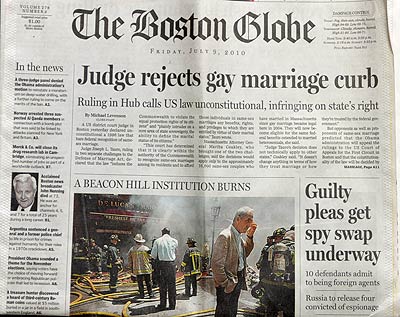
July 9, 2010: The DOMA ruling in Boston Federal Court was celebrated in the mainstream press as a great civil rights victory.
But the “equal protection” clause was the primary argument they used, but one of the Massachusetts lawsuits also invoked the 10th Amendment “states’ rights” argument. (Ironically, the “states’ rights” argument has also been used — more persuasively — by lawyers on our side of this case. They argue on the rights of states NOT to recognize “gay marriage” on a federal level.)
MassResistance had followed the two lawsuits in Massachusetts, one filed by Massachusetts Attorney General Martha Coakley and the other by Gay and Lesbian Advocates and Defenders (GLAD) legal group, as they went through the federal court in Boston. Read our analysis published in 2010.
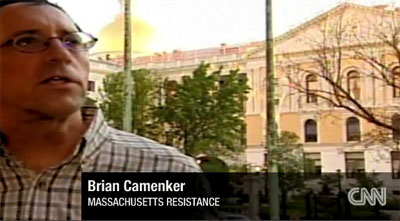
VIDEO: Telling it like it is. After the Boston Federal Court ruling, Brian Camenker of MassResistance was interviewed by CNN.(Also see video of local TV interview.)
All four anti-DOMA lawsuits won in the federal courts. A contributing factor was the weak-kneed defense of DOMA by the Obama Administration’s justice department. The DOJ’s reluctance to be aggressive was admitted to in a statement in February, 2011.
From these, the US Supreme Court selected the New York case, Windsor v United States, to hear. But after seeing how poorly the Obama Administration defended the DOMA case in the lower courts, the House of Representatives sued and won the right to hire its own legal counsel to defend it before the Supreme Court. They hired former Solicitor General Paul Clement.
After Clement accepted case, his high-profile firm, King and Spaulding in Atlanta, caved in to pressure from homosexual activists and withdrew the firm it! So Clement resigned from the firm and has continued defending DOMA.
The DOMA lawsuit targets particular part of the law (Section 3 in the statute) which states:
In determining the meaning of any Act of Congress, or of any ruling, regulation, or interpretation of the various administrative bureaus and agencies of the United States, the word “marriage” means only a legal union between one man and one woman as husband and wife, and the word “spouse” refers only to a person of the opposite sex who is a husband or a wife.’
The plaintiffs have argued that the federal government must treat “gay marriages” the same as regular marriages throughout all its laws, regulations, etc., because “gay people” have the same rights as everyone else and “gay marriages” are still marriages. Otherwise, “gay people” are not being treated equally under the law. And it’s the right of the states to determine that.
Unfortunately, in our opinion, Clement’s oral arguments before the Supreme Court and in his briefs were only moderately better than the pro-family Proposition 8 lawyers. He didn’t aggressively take on the heart of the matter regarding “equal protection” — the issue of homosexuality and homosexual behavior. Instead, he mostly stuck to the states’ rights argument and the traditional purposes and reasons for the institution of marriage.
Interestingly, it was Justice Kagan who brought out the fact that DOMA was originally passed because of the widespread disgust over homosexuality in America. As Politico reported:
Kagan read aloud from the House Judiciary Committee report on DOMA which described the statute as a way to resist the immorality of homosexuality. “I’m going to quote from the House report here….’Congress decided to reflect an honor of collective moral judgment and to express moral disapproval of homosexuality,'” she said.
How important are these points? No one can really tell.
If the Supreme Court upholds the lower court ruling and overturns the key Section 3 of DOMA, the homosexual movement can accomplish the following:
- It would require the federal government (funded by taxpayers in all 50 states) to include homosexual “marriages” in all federal benefits. This includes Social Security, federal pensions, Medicare, Medicaid, Veteran’s benefits, and everything else involving marriage, including filing jointly on Federal income taxes.
-
It also includes access to federal programs and other things run or controlled by the federal government, such as housing, federal loans, passports, health insurance, military housing, burial in military cemeteries, etc. Thus, the federal government would recognize homosexual behavior as equal to regular marriage throughout the range of all its activities.
- But even more frightening: Given the wording of the decision it would also likely extend to any activities that receive federal funding, such as state programs, college programs, and virtually anything else involving federal money, such as federal contracts. We believe that the Obama administration would use this as a lever to accelerate the forced equalization of homosexuality with heterosexuality in all federal activities or anything connected to federal money — similar to the way it did in the military with the repeal of “Don’t Ask Don’t Tell.”
Also going on: Massive nationwide PR assault
The two Supreme Court cases are the homosexual movement’s “ground war.” There is also the “air war” going on.
Most people, even pro-family activists, don’t realize that for the last few months America has been under what’s likely the largest and most expensive public relations campaign in the history of the homosexual movement.
All of those politicians (including some Republicans) who are suddenly very publicly “coming around” on the “gay marriage” issue isn’t a coincidence but clearly the result of a very intense lobbying effort — targeted for the time when the Supreme Court would be considering the “gay marriage” cases.
The same goes for the huge news generated when Sen. Portman’s “gay” son conveniently persuaded them to change his mind at just the right time. And how does it happen to get into all the right media in the right way? It goes on and on. There are the full-page ads in major newspapers listing the major corporations supporting “gay marriage.” The influx of gay-marriage and gay-relationship issues on this season’s TV shows. The magazine stories, including TIME with the homosexual kisses. Even the flood of Internet ads (even on conservative sites) on gay marriage. And of course, the phony polls on major networks showing a huge national support for gay marriage. We’ve even seen “gay rights” sidewalk canvassers in some cities.
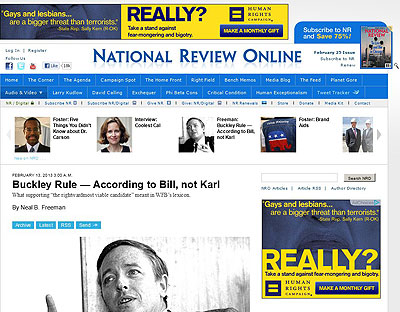
“Gay” ads flood the Internet. And we meaneverywhere! Actual screenshot of National Review Online website, Feb. 13, 2013 with two prominent ads for Human Rights Campaign, radical homosexual group. Ads say: “Take a stand against fear, hate-mongering, and bigotry. Make a monthly gift.”
Most of the money for this seems to be flowing from established groups like Human Rights Campaign, GLAAD, and National Gay and Lesbian Task Force. But there are obviously other vehicles that are less visible at work.
It a D-Day-like effort to persuade the nation — and especially the Supreme Court — that “gay marriage” is inevitable and that trying to fight it is fruitless.
A tale of two marriage rallies: DC and Boston
The two “gay marriage” rallies that took place the first day of the first Supreme Court “gay marriage” oral arguments said a lot about the nature of this battle.
On Tuesday, March 26, thousands of regular pro-family people made the trip to Washington DC and marched outside the Supreme Court building, easily outnumbering the homosexual activists gathered there. The speakers were various pro-family activists, group leaders, and a few politicians.
That same day in downtown Boston it was the elites: The homosexual lobby and the liberal establishment held its own rally celebrating the DOMA lawsuit which was first filed in Boston. It attracted a few hundred activists and press. But the speakers were an impressive gathering of at least a dozen prominent city, state, and federal politicians, including the Mayor of Boston, Congressman Ed Markey, along with major homosexual activist leaders. (There was one Republican, US Senate candidate and current state rep. Dan Winslow, who gave a rousing pro-gay speech.)
VIDEO: What it was like. Scenes from the two marriage rallies: Washington DC the Boston.
How will the Supreme Court rule?
As the battle continues across the country, over the next few months the Justices and their staffs will digest the oral arguments and the large number of amicus briefs submitted by both sides, and also discuss the cases among themselves. It’s generally predicted that they will release their decision in the latter part of June, just before this year’s session ends at the end of June.
If this were decided strictly on the rule of law, we think that both cases would lose. Applying “equal protection under the law” to homosexual behavior is absurd by any rational application. And the states’ rights argument is far-fetched, despite the liberal Boston judge’s ruling; DOMA was written to protect states’ rights. But unfortunately, there’s a long history of the courts ignoring the obvious constitutional law.
The conventional wisdom is that Anthony Kennedy will be the deciding vote on this. So most of the national focus has been on him. Scalia, Thomas, Roberts, and Alito are considered safe traditionalists expected to decide against both cases, and Ginsberg, Breyer, Sotomayor, and Kagan are seen as left-wing on just about everything and will support both. (The fact that Sotomayor and Kagan, the Obama nominees with documented radical pasts, are even on the Supreme Court is a testament to the cowardice of the Republican Party for not blocking them when they should have.)
Many commentators have also read in their tea leaves that Kennedy is not eager to have the courts mandate national “gay marriage” by fiat the way the court did with the much-maligned and contentions 1972 abortion ruling. But it’s hard to believe that they would leave the homosexual movement with nothing at all.
Our prediction is that Kennedy will not overturn Proposition 8 and mandate gay marriage everywhere. But he’s likely to strike down DOMA to at least some degree, and force it throughout the federal government.
But who knows? Whatever side of the bed Kennedy gets up on that day could determine the fate of the family structure and morality in America. It’s a terrible situation. The Founding Fathers never intended courts to have this kind of despotic power over the country. But our politicians (and ultimately the citizens) and have allowed it to happen.
On the other hand, there’s still two months to go. Anything can happen. If anything the fight needs to be stepped up.

